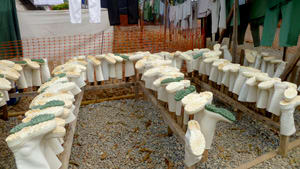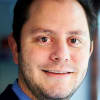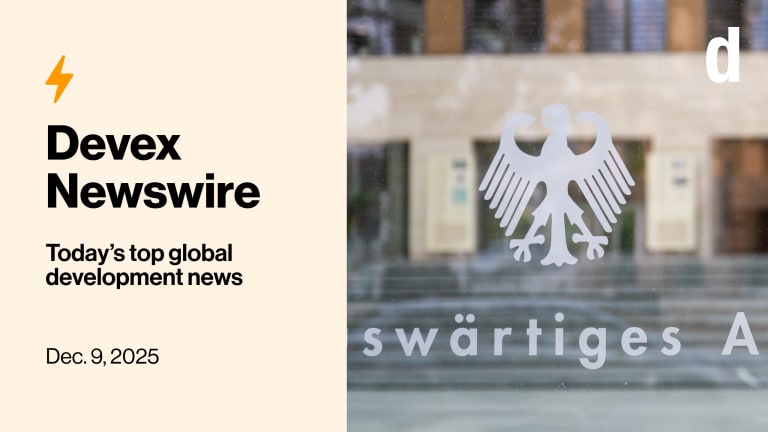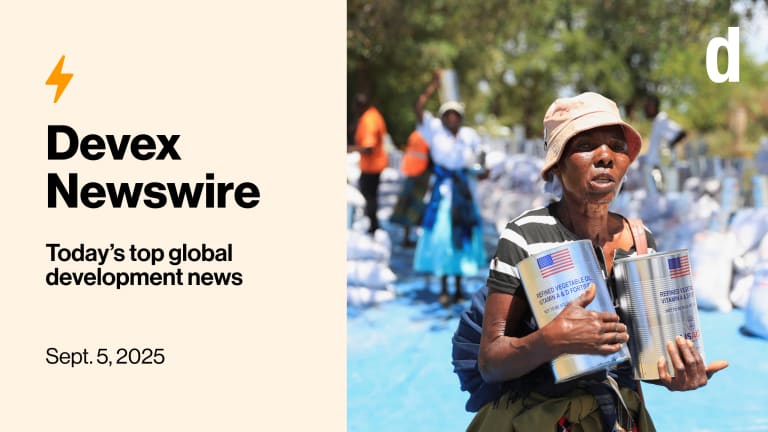
In the course of my work as an associate editor at Devex, I’ve been privileged to meet a number of high-profile luminaries in the global development industry. It’s not every day, however, that I get to meet a person of the year.
But in early December 2014, I met dozens of them while traveling to Conakry, Guinea, with European Commissioner for International Cooperation and Development Neven Mimica.
Time magazine — which this week honored the tireless work of global health workers to curb the Ebola epidemic by naming them collectively as “person of the year” — characterized their mission in West Africa, a region ravaged by the crisis, as a war “waged with bleach and a prayer.”
Matters of faith aside, perhaps, it can certainly be considered a war: one of attrition, where the risks are real and the pressure is incessant for the many thousands of health workers on the ground in Guinea, Sierra Leone and Liberia as well as Mali, Nigeria and beyond.
See more news on Ebola:
● Health not only priority for EU-funded programs after Ebola — Mimica
● EU-ACP lawmakers urge economic recovery efforts in Ebola-affected nations
● Jim Kim wraps up tour of Ebola-affected West Africa
And, like in any war, there are clear and present dangers, with little or no respite from active service. The war on Ebola is being waged around the clock, seven days a week, two months on the ground at a time. This is not a call of duty for the work-shy or the faint-hearted. The tension of the situation and the strain faced by the health workers in dealing with a task of such gargantuan proportions is palpable, but the overriding impression is one of professionalism and solidarity.
Unlike a conventional war, there is an absence of fear here among the footsoldiers of the advance against the virus.
Into the danger zone
“I am not afraid; we are not afraid,” Xavier Trompette, project director of a flagship European Commission-funded Ebola treatment center run by Médecins Sans Frontières in the Guinean capital Conakry, told us as we stepped inside the camp’s perimeter and into a “twilight zone” of chlorine, medical scrubs, wellington boots, goggles and yellow overalls.
Conditions here are hot and humid, reaching upwards of 45 degrees centigrade inside the protective suits needed for the hour-long stints inside the center’s isolation ward — the only permanent structure in the compound, built in the 1960s — to tend to the 14 suspected and 39 confirmed cases on site. In these soaring temperatures, health workers can lose up to 1 kilogram of fluids in just one hour.
But this is no “slim-fast” plan. Checked and double-checked by colleagues, time-stamped and logged before they cross the entry point, it’s the prescribed regimen to keep them and their co-workers safe — and alive.
Dealing with dozens of suspected cases each day naturally signals danger. It’s also a well-drilled exercise in vigilance, discipline, precision, minutiae and ultimate control of process and personnel management.
On the day we visited, a gang of people converged and congregated outside the clinic. Among them, one suspected case of contagion, possibly two. But there’s no isolation here — they all come together as a group, a community. Tragically, this close-knit bond only serves to increase the threat of contracting the disease, and it makes the awareness-raising work of the international development actors present here even harder.
Staff at the front gate to the compound processed the suspected cases, washing hands with disinfectant, spraying shoes and covering bare or sandaled feet with plastic coverings. They were then processed, filling out forms, and led away to a separate side entrance of the complex, an interconnected warren of tents, lean-tos and wooden structures draped with plastic tarpaulins.
An Ebola treatment center in Guinea may maintain 180 staff — in the case of the one I visited in Conakry’s Donka district, 12 expatriates and 168 locals — to cope with current intake levels and cost about 300,000 euros ($350,000) to run each month. The three main tasks at the center are to carry out patient collection in Conakry and outlying areas, provide on-site care to suspected and confirmed cases (three health workers tending to each patient, five in the case of death), and conduct theoretical and practical courses for NGOs, expat medical workers and Ministry of Health staff.
Currently, suspected victims undergo a four-hour lab test — supported by the Pasteur Institute — and must remain isolated for a period of up to 72 hours in order to supply a good sample of the virus, which could put strain on the center in case Ebola cases surge as they did earlier this year. With that in mind, Trompette confirmed that plans were underway to move to a new site to increase the current capacity of 85 patients and improve the “far from perfect” flow of visitors — an important right granted to the victims’ families — around the compound.
Although Trompette asserted that the epidemic in Conakry was “not burning” and that his team was managing “for now,” many of the aid workers I spoke to on the ground said that more trained staff, more volunteers and more centers are needed in Guinea and other Ebola-affected nations in West Africa.
“The government wants to build real treatment centers like the MSF one, but the costs are too high and it takes too many resources,” explained one French aid worker, who mentioned that the short-term solution is smaller transit clinics that the World Health Organization is reportedly pushing for in the region.
In a similar vein, three European Mobile Laboratories — or EMlabs — have been mobilized by the European Union in Guinea, Nigeria and Liberia to detect incidences of the virus and train health workers about Ebola and other life-threatening pathogens.
Ebola is just the beginning
West Africa is facing down the worst Ebola epidemic on record. With more than 20,000 people infected and more than 8,000 deaths as of early January 2015, the unprecedented scale of the Ebola epidemic clearly requires a robust and effective coordinated international response.
Beyond the human tragedy, the disease is having devastating effects on the security and economy of the whole region. Schools have been closed for months — in Guinea, only the French school in Conakry remains open; borders to neighboring countries remain closed, interrupting or halting cross-border trade altogether; black markets are flourishing; and looting and intimidation of shopkeepers and stallholders is rife.

Health systems too are being pushed to the point of collapse. Mortality related to other diseases is resurgent as the region’s focus has shifted to Ebola — although conversely, sources on the ground in Guinea confirmed that incidences of cholera were falling largely due to the fact that more people were using hand sanitizer.
Margaret Chan, the World Health Organization’s director-general — an organization criticized for its initially slow response to the crisis — has admitted that Ebola is still “running ahead” of efforts to contain it, despite recent improvements, and warned against complacency.
On the ground in Conakry, the Ebola response machinery continues to gear up to tackle what everyone is hoping will be short-lived war before moving onto the broader challenges, such as those taken up by the European Commission’s new 241 million-euro funding package for state building, health systems strengthening, rural and urban sanitation, poverty reduction and economic development.
Indeed, Mimica, the European aid chief, stressed to me that the global development community is very much here to stay, committed to helping West Africa first contain the epidemic and then get back on its feet in such a way that in the future it will have the right systems in place to prevent a similar outbreak before it spirals out of control.
And what of national efforts?
“The government has nothing; we’re relying on the international community for assistance,” one local told me.
To its credit, the Guinean government has announced that 20,000 volunteers will be mobilized to help cope with the outbreak — including thousands of young people. However, beyond relief efforts, it remains to be seen how the government will redress the balance and prioritize the long-term prevention of costly epidemics through ultimately more cost-effective investments in strong and accessible health systems.
For now, at least, the international aid community remains out in full force. All around Conakry, anti-Ebola efforts are highly visible on signs and billboards with practical tips for the population, and practically on every street one can see warehouses and vehicles emblazoned with the logos of groups such as WHO, the U.S. Centers for Disease Control and Prevention, UNICEF, the European Commission, the Red Cross, MSF and ALIMA, the regional platform for medical NGOs.
A reassuring sight for the estimated 2 million locals in Conakry, perhaps, but when will we really know if the war on Ebola will be won?
“I’m not an epidemiologist,” Trompette said tersely. “We can only deal with the situation in front of us.”
I salute his pragmatism, wish him luck with the work yet to come and wholeheartedly applaud Time’s choice to make global health workers their person — or team — of the year. Here at Devex, our thoughts are with those serving on Ebola’s frontlines — the first responders, doctors, nurses, epidemiologists, virologists, logisticians, tracing and treatment teams, liaison officers and local volunteers — who are among the very modern heroes in our midst.
Are you engaged in the fight against Ebola? Please share your impressions and takeaways from the frontline with us by leaving a comment below.
Read more international development news online, and subscribe to The Development Newswire to receive the latest from the world’s leading donors and decision-makers — emailed to you FREE every business day.








